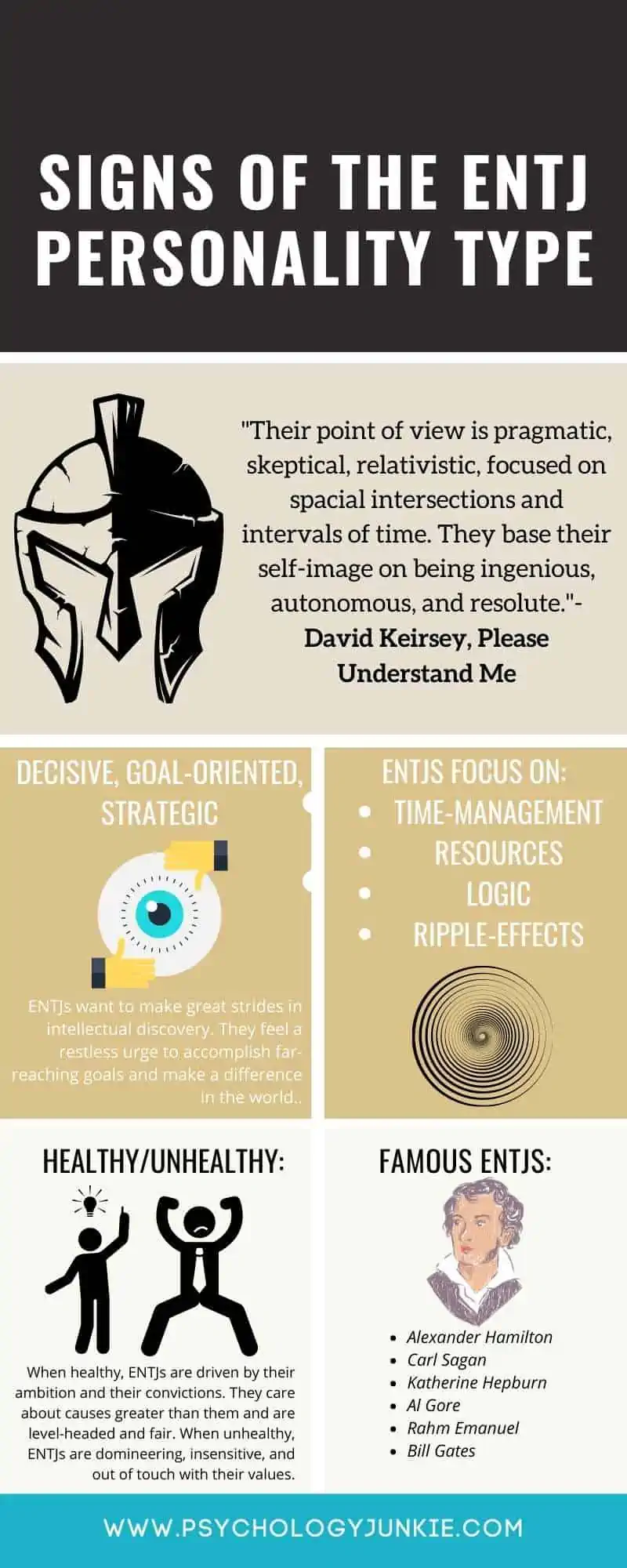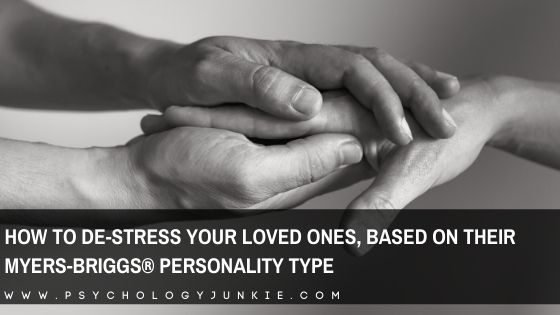24 Signs That You’re an ENTJ, the Director Personality Type
Have you ever wondered which of the 16 Myers-Briggs® personality types fits you best?
Do you feel like you might be an ENTJ but you’re not sure?

Perhaps you’re trying to understand an ENTJ in your life a little better!
If so, then this article is for you! Today we’re going to break down some of the most common characteristics of the ENTJ type. There are a lot of bad stereotypes about ENTJs out there, so I think this post is especially important.
Let’s get started!
Not sure what your personality type is? Try out our most highly recommended personality questionnaires:
- You can take our free personality questionnaire here
- You can take Personality Hacker’s highly accurate personality questionnaire.
- You can take the official Myers-Briggs Type Indicator® for $49.95
This article contains an affiliate link to a questionnaire on Personality Hacker. If you purchase one of their courses, I get a small kickback that I can use to pay for hosting and other demands of this site. I only recommend courses I love.
24 Signs That You’re an ENTJ Personality Type
#1 – You Value Objectivity
Carl Jung, the mind behind Psychological Types, says of ENTJs, “This type will, by definition, be a man (or woman) whose constant endeavor – in so far, of course, as he is a pure type – is to make all his activities dependent on intellectual conclusions, which in the last resort are always oriented by objective data.” (Psychological Types, 346)
As an ENTJ you care about fairness and unbiased, objective rationality. When life gets murky or a tough decision has to be made, you will step outside of the situation to try to see the facts clearly and make the most logical choice. Sometimes this can bother people who think you should “think with your heart” more. However, usually the goal for you is to be as fair and reasonable to everyone as possible – which, for you, is thinking with your heart.
#2 – You Have a Drive to Accomplish Goals
Everyone wants to accomplish goals, but for you, it goes beyond writing a note down on your New Year’s Resolutions and forgetting about it. You don’t just make goals, you map out a timeline and create the steps necessary to get there. Then you take the steps.
You have a strong drive and ambition, which comes from your need for growth – both in yourself and the world around you. You want to create an impact and make something of yourself, whatever that looks like for you. You take action on these goals not just because others are expecting it from you but because you have a personal need to grow and be better.
#3 – You Crave a Challenge
As an ENTJ, a life without challenge is a meaningless and empty life. You need to feel like there’s a higher hurdle to jump, a higher peak to scale. When difficulties arise, you see them as challenges to be overcome rather than reasons to sulk in the corner. You use these challenges to stretch and grow yourself. You may even feel a little excited at challenges that would send other people running for the hills!
#4 – You Have a Knack for Allocating Resources
You’re a resource conscious person. You’re always aware of what you have and how it can be used to maximize growth or push you in the direction you want to go. You have an eye for efficiency, recognizing when certain resources are being used inefficiently or not at all. You’re also good at judging the value of different resources and gathering a team to help you use them effectively.
#5 – You Get Disillusioned with Humanity
Joel Mark-Witt and Antonia Dodge from the Personality Hacker podcast say of ENTJs, “ENTJs can become cynical when people make bad decisions or don’t do the reasonable or obvious thing. This can make it challenging for an ENTJ to sympathize with people’s individual situations and struggles.” (Personality Hacker, 325)
As an ENTJ, you see life very much in terms of cause-and-effect. You also are deeply intuitive and notice the ripple-effects of actions usually before they’re even taken. It confounds you when you see people state that they want something or need something, and then their life choices lead them in the opposite direction of their goals. For example, if you have a friend who’s always blaming the government or capitalism for their financial woes yet they never change their spending habits, save money, or invest, you may find yourself shaking your head in confusion. Situations like this probably are fairly regular for you.
#6 – You Care About Sustainability
You know that in life you have to have an effective way of living and managing resources so that your whole plan doesn’t break down. If something is fun now but going to create setbacks in the long run, it’s not worth it to you. You think large scale and concern yourself with the long term effects of your actions–not just on yourself but also on the world around you. You want to make sure that your decisions are going to be meaningful and sustainable for the future.
#7 – It Can Be Hard for You to Relax
As an ENTJ you’re always thinking about the next goal or objective. You get a thrill from making headway towards your vision and once you’ve achieved that vision, you’re often thinking of the next big dream. Because of this ambitious drive you often struggle to settle down and get some much-needed R & R. You may even feel a little guilty for taking time away from your work, but it’s important to remember that balance is key – and relaxation can be just as productive as working. After all, you can’t be a sustainable resource if you’re sick, exhausted, or foggy from lack of sleep.
#8 – Stagnancy Infuriates You
You hate when things stay the same forever. You want to constantly be growing and evolving, so you crave change. When things feel like they’re stuck in a rut, it makes you antsy and uncomfortable. You don’t understand why other people seem okay with staying where they are–you want to grow as a person and attain some higher goal. You would rather take risks and live with the consequences than stay in a steady state forever. This can make you seem restless or constantly dissatisfied, but it’s really just your ambition and drive that won’t let you settle down.
#9 – You Have a Natural Eye for Effectiveness
You often think about how to get systems to run so efficiently that they need as little gruntwork as possible. You’re excellent at recognizing which resources are necessary and which ones can be cut out of the equation entirely. You like to figure out ways to make processes more streamlined so that they take less time and effort, while still meeting their goals. All in all, you have a knack for finding creative solutions to problems that might seem insurmountable to some.
#10 – You Have a Passion for the Profound
A lot of people talk about ENTJs like they are mechanical warlords with nothing driving them but a lust for power. Yet many ENTJs would balk at the idea of craving power merely for power’s sake. The two introverted functions that motivate ENTJs from the inside are Introverted Intuition (Ni) and Introverted Feeling (Fi). Introverted Intuition gives ENTJs a desire to understand the “dance of life” and all the complexities that come with it. It also gives them a drive to uncover profound truths and understand the greater meaning of life. Retrospectively, this can be why you may feel like your goals are almost too big – because you truly do want to make a meaningful impact on the world.
Introverted Feeling (Fi) gives healthy ENTJs an inner conviction to a personal set of values and beliefs. These inner values are often what drive ENTJs to make the big, sweeping objectives they dream up. It’s the idea that if they can accomplish their goals, then they will have done something meaningful in life – a feat of significance to them and those values that are dear to their heart.
Many ENTJs experience a deep restlessness and longing in their soul to understand more or to achieve something grandiose. It’s an internal call to find a big-picture vision and contribute something meaningful that will outlive them. This profound drive is what can make many ENTJs so inspiring, dynamic, and creative individuals.
#11 – You Naturally Shift Perspectives
Another false stereotype of the ENTJ personality type is that they have no patience for anyone with different perspectives than their own. The truth is far different. ENTJs who are in touch with their intuition have a unique ability to shift perspectives until a solution or insight becomes clear.
“As an ENTJ, getting inside other people’s minds means recognizing not only how their experiences have shaped them, but the conclusions they’ve come to about how life works. This can include their beliefs, paradigms, and strategies of behavior.” – Joel Mark Witt and Antonia Dodge, Personality Hacker: Harness the Power of Your Personality Type to Transform Your Work, Relationships And Life, 334
You can be surprisingly empathetic and insightful about what is motivating other people. While you may not have the “warm and fuzzy” demeanor of some feeling types, you are often still understanding and willing to make space for different beliefs.
#12 – When Deeply Stressed, You Tend to Feel Abandoned and Alone
When you first begin to experience stress you rely on your Thinking side to grasp solutions. You’ll look at the pros and cons of various choices, the consequences of what’s happening, what part you may have played in the struggle and how you can fix it. Troubleshooting and problem-solving are your go-to methods of dealing with stress initially. But if stress only continues or increases, you can burn out your Thinking function and hurtle into the grip of your inferior function: Introverted Feeling (Fi).
Suddenly you feel overwhelmed by the burdens you’ve taken on and the mental labor you’ve poured into solving problems. All the deep, personal feelings you push away to stay “objective” come flooding back. Often the result is that you feel feel deeply alone and abandoned. You might resent others for benefiting from the work you’ve poured into managing so many tasks.
It’s as if the world has given up on you, leaving you to bear the responsibility of fixing everything. This can be a difficult experience for ENTJs who are used to being independent, in control, and tough-minded in their endeavors. Yet if this experience is recognized for what it is (the grip of the inferior) and processed properly, it can bring a great depth of personal growth. You may also find new ways to seek help from others and rely on them for support – something ENTJs are often reluctant to do.
You can find out more about stress and your personality type here: What ENTJs Do When They’re Stressed Out
#13 – You Believe That Actions Speak Louder Than Words
ENTJs are known for their active lifestyle, preferring to spend more time doing than talking. You’re a problem-solver at heart, and you understand that the best way to get results is by taking action. You’ve learned that for a lot of people, talking is just a way to avoid doing anything productive. It’s offering “lip service” to a person or goal, without making any forward movement.
If you care about someone, you tend to show it through action. You help them out in practical ways and offer them resources that you hope will help them. If you have a cause that matters to you, you’ll help out in practical ways as well.
You’re less likely to give empty words or compliments and more likely to do something that demonstrates your support. This can be a great strength, as it shows that you aren’t afraid to take risks for the sake of helping others and doing what’s right. However, it can also alienate some people who prefer verbal encouragement and appreciation. It’s important to remember that sometimes a few kind words can go a long way, too.
#14 – You Have a Directing Way of Speaking
You like to be straightforward and get straight to the point when you’re speaking. While some people take this the wrong way and call you “bossy”, your goal is merely on getting the information to the other person as directly as possible. You can have moments of being very polite and friendly, but when a job has to get done, you’re not going to mince words or sift through a lot of small talk.
#15 – You Hate Passive-Aggressiveness
Clarity is something you value in every part of your life. Whether you’re accomplishing a task or falling in love, you want to know exactly what needs to be done and where you stand. People who give you the silent treatment or act passive-aggressively are purposefully keeping you in the dark for….some reason? To punish you? You don’t understand it, and it infuriates you.
You’d much rather just have a direct conversation about the problem so that everyone can be heard and hopefully come to some sort of resolution. Passive-aggression is a sign of immaturity in your opinion, and you want nothing to do with it. You would rather just handle things head-on and move on.
#16 – You Are Highly Aware of Time
Time is short, and you know this. Your whole life you’ve probably felt this sense that there’s just not enough time to do everything you want. You constantly strive for balance between your personal life, career goals, and relationships, but it can be a struggle at times. You wake up, map out your day, figure out which “boxes” you’re going to put all your responsibilities into, and move forward. If someone bursts into your life disrupting your time-table, you can become frustrated.
You have a lot of big ideas and aspirations that require dedication and focus. You aren’t someone who can just drift through life with no direction – you need to create a plan and stick to it if you’re going to get anywhere. You are usually fast-paced and energetic, often finding it hard to sit still, even at home.
#17 – You’re Decisive
You believe that a quick decision is often the best one – unless it’s an emotional decision. You believe that no matter what happens you’ll be able to bend with the situation and make adjustments. But sitting around mulling over a decision makes you impatient and restless.
If there’s something that needs to be done, you’re the one who is going to take action and make it happen. You have a strong sense of confidence in yourself and your ideas and are willing to stand behind them no matter what happens. And if you screw up, you have faith that you can muster up the resourcefulness and strength to fix the problem.
#18 – You Have a Gift for Strategy
David Keirsey, a psychologist and author of Please Understand Me, calls ENTJs “Fieldmarshals”. He goes on to say that ENTJs, “arrange a well-ordered hierarchy that makes possible the chain of command and the mobilizing of forces. In their campaigns these expressive, energetic Coordinators commandeer whatever human capabilities and material resources are available and use them to execute a complex strategy, such as was done by Napoleon in his twenty years of campaigning in Europe.” (
Many ENTJs enjoy strategy tabletop games, such as chess or Risk, which allow them to explore different possibilities and plan out their moves in advance. In fact, this is one of the only leisure activities I hear ENTJs regularly mention enjoying. But this strategic mindset shows up in every area of the ENTJs life. You likely have a knack for understanding the big picture of any given situation and can come up with creative solutions that help you reach your goals.
#19 – You Show People You Care, But Sometimes They Don’t See It
Linda Berens, a psychologist and author of The Sixteen Personality Types: Descriptions for Self-Discovery says of ENTJs, “Others sometimes see them (ENTJs) as brusque and critical and can miss the ways they show how much they care. Caring is shown less through gestures of kindness and affection than through personal action – doing things for people they care about and persistently pursuing goals and advice based on strategic thinking.”
Many ENTJs will orient their goals around the needs of the people they love, or they will help out in practical ways. As an ENTJ myself I will help out by offering strategic advice, doing a practical chore that the other person doesn’t want to do, or offering time and resources to troubleshoot a problem for them.
#20 – Honesty is Crucial to You
In any relationship, professionally or romantically, you prize honesty. Some people find this refreshing and others find it harsh, but it’s almost painful for you to swallow the truth or pretend to be or feel something that isn’t authentic. This doesn’t mean that you feel like you should blurt out all your worst and most mean-spirited thoughts. You’re a Thinking type after all, and you subject your thoughts to some form of rational analysis (even if it’s out loud). It’s not always rational to be a jerk, and it’s certainly not rational to trust your feelings as “fact.” But you will share your honest, vetted feelings, and will problem-solve out loud, often voicing a critique or giving advice in the process.
#21 – You Despise Irresponsibility and Stupidity
Excuses, complaining, and lack of follow through are some of your least favorite traits to encounter. You have zero patience for people who don’t use their brains, and you believe that any problem can be solved with careful planning and effort.
At work you have an almost zero-tolerance policy for people who don’t do what they agreed to do or who don’t use the resources available to them to educate and empower themselves. You struggle to find sympathy for people who don’t take responsibility for their own lives and actions, believing that we all have it within us to create something better if we just put our minds to it.
That said, many ENTJs as they grow and mature, learn that other people allocate their resources to things other than what they (the ENTJ) would naturally care about. Some people see responsibility as tending to relationships but care less about meeting some lofty work goal. Other people feel a responsibility to get time alone to learn and care less about challenging themselves in an external way. As ENTJs grow and develop, they become more patient with how others interpret their responsibilities and live their lives.
#22 – You Like People Who Make You Smarter
Some people are drawn to a quick joke or an attractive smile. You like people who challenge you to think harder and grow intellectually. As an Intuitive-Thinking type you look for “mind mates” in the world. You want to debate, analyze, and discover with someone else. When people are interested in exploring intellectual territory with you it can create a bond like nothing else. These are the people you want to center your life around.
#23 – You Naturally See Roadblocks and Circumvent or Destroy Them
It’s natural for you to figure out what’s preventing you from doing what you need to do. Be that a lack of resources, skills, or confidence, you’ll work to acquire or develop those things as quickly as possible. You won’t settle for mediocrity or conceding to an obstacle. You will either find a way around it, through it, or just bulldoze over it.
#24 – You Have a Heart for Specific Causes
Many ENTJ stereotypes imply that your personality is uncaring, unfeeling, and cold. But this is far from the case! Every personality type cares; they just show it in different ways. Every personality type feels; they just express and interpret those feelings in different ways. As an ENTJ you have a process called Introverted Feeling (Fi) as your inferior function. Some people think because it’s labeled “inferior” that it’s absolutely useless or inconsequential. But this is not the case.
John Beebe, an American psychiatrist and Jungian analyst, states that the inferior function maintains a balance for the personality. ENTJs have dominant thinking and inferior feeling. They feel less secure in their feeling function, more likely to experience “shame” or embarrassment, but it is still a part of them. It is still an “ego-syntonic” function (something that they associate as part of themselves). ENTJs need their feeling side to have a healthy Thinking side.
While ENTJs may not express their feeling-values a lot, or wax poetic about their emotions, they still have causes that are near and dear to them. These may be environmental issues, animal protection, or advocating for human rights. Often they feel things more deeply than anyone realizes because they rarely give voice to these feelings for fear of experiencing shame or ridicule. You’ll often see their feelings translated into work they find meaningful.
As ENTJs grow and mature they become more comfortable with their feeling side. It’s important for them to develop a healthy relationship with their emotions, feelings, and values, because the feeling and thinking sides of the ENTJ make up the “spine” of their personality type.
If you’d like to learn more about the inferior function you can check out my article here: The Inferior Function of Every Myers-Briggs® Personality Type
Other Articles You Might Enjoy:
The ENTJ Personality Type and the Enneagram
What Are Your Thoughts?
Did you enjoy this article? Do you relate to these 24 signs? Share any thoughts or perspectives in the comments for other readers!
Explore more about your personality type in our eBooks, Discovering You: Unlocking the Power of Personality Type, The INFJ – Understanding the Mystic, The INTJ – Understanding the Strategist, and The INFP – Understanding the Dreamer. You can also connect with me via Facebook, Instagram, or Twitter!
Sources:
Psychological Types by Carl Jung
Personality Hacker: Harness the Power of Your Personality Type to Transform Your Work, Relationships and Life by Joel Mark Witt and Antonia Dodge
Depth Typology by Mark Hunziker
The 16 Personality Types: Descriptions for Self-Discovery by Linda V. Berens and Dario Nardi














I’m sure there’s some valuable information in this article, however, the title is incorrect. ENTJs aren’t ‘the architect’ archetype, that’s INTJs
Instead, ENTJs are ‘the commander.’ Next time you write an article, please consider using the correct information.
Hi! You are picking the names from the 16 Personalities web site. I am not affiliated with that web site and they are not connected to Myers-Briggs. As far as I know, nobody from the 16 personalities web site has an MBTI certification. They have a knock-off version of Myers-Briggs that’s mixed with Big 5 theory, and their test usually types people incorrectly. Since I am a completely different web site I have picked my own names for the 16 types based on my time as a practitioner. Hope that clears up any confusion.
Hi Susan. Which test should we take instead? Thanks.
Hi Albert!
I have created a questionnaire here: https://quiz.tryinteract.com/#/5dab0e69919f5e0014ceba9f
You can also take the official Myers-Briggs® Type Indicator here: mbtionline.com
Thanks for asking!
Susan
Instead of correcting yourself you’re letting comments pile up for the sake of ‘engagement’. Are you using the 50 books on your desk as paper weights Susan?
ENTJ isn’t the Architect personality type, it’s the Commander type.
Confused that information in this article appears to be inconsistent with thatl found in “An Introduction to the Cognitive Functions in Myers-Briggs® Theory” posted by same author in 2018. The emphasis on Ni and Fi particularly strange since they were established as not dominant in ENTJ, could you explain please?
Hi! Ni and Fi are not dominant in ENTJs, they are auxiliary (Ni) and inferior (Fi). They are still part of the ENTJ’s cognitive function stack and therefore “Ego-syntonic” (associated with the self – feel like part of them). ENTJs are dominant in Extraverted Thinking (Te). But when we’re talking about the ENTJ type all the functions come into play because they all work in tandem. I hope this helps!
Thank you for this! Very thorough and insightful. I finally feel seen.
-An ENTJ
Sorry, but you are incorrect. The archetype for ENTJ is not the Architect. I am not referring to 16 Personalities, either. INTJ is the Mastermind and ENTJ is the Commander. This is literally from the Myers Briggs literature. You can’t just make it up as you go. That would be as irresponsible as claiming 16 Personalities is a psychological assessment.
Hi Dawn, which literature are you referring to? I have probably 50 Myers-Briggs® books at my desk here, and have been trained as a certified practitioner. Different authors and web sites that talk about typology come up with their own names for the types (like 16 Personalities does). Everyone is free to do so. The official MBTI® Manual does not give archetypal names to the types, only referring to them by their four-letter codes.
from what I can see on the official MBTI web site (https://www.mbtionline.com/en-US/MBTI-Types/ENTJ) they title ENTJs “the decisive strategist”
Just correct yourself please INTJs are the Architects, period. Unless this is your new found independent research. You may cause someone to fail an exam or get confused.
Hi Habib,
I would correct myself if there was something to correct. There are many web sites and authors that talk about Myers-Briggs personality types. They all give them different names. The 16 personalities web site calls ENTJs “The Commanders”, the official Myers-Briggs documentation calls ENTJs The Decisive Strategists, psychologist Linda Berens calls ENTJs the Strategist Mobilizers™, and Personality Page calls ENTJs the Executives. I have had the title “The Architect” for ENTJs for many years now. I am not affiliated with any sites calling them “The Commanders” therefore I do not want to “steal” their name for the type or represent myself as affiliated with them. I created 16 different names for the 16 different types that I thought fit best – just as the other typology writers have done. I am tempted now to change the ENTJ name to something else just so I don’t have to keep dealing with misunderstandings about it in comments like these. But I am not going to use “The Commander” because that is 16 personalities chosen name for ENTJs and I am not in any way affiliated with their site.
Whatever the name you have choosen to identify the ENTJ, the article was great. Thanks. And identified me as much as andy description can. I was interested to see that you identified yourself as and ENTJ (#19). I thought over the years I have been reading your articles that you identified as INFJ. Did I miss something?
Wow the comments on here are very harsh. You might not agree with some of her wording, I’ve learned a lot about this personality. I am ENFP, I believe my daughter is ENTJ, we are not on speaking terms. I’m seeing things I misunderstood but now my eyes are open. I thank you for this article. For all of you arguing with her, that is controlling behavior and you need to check yourself.